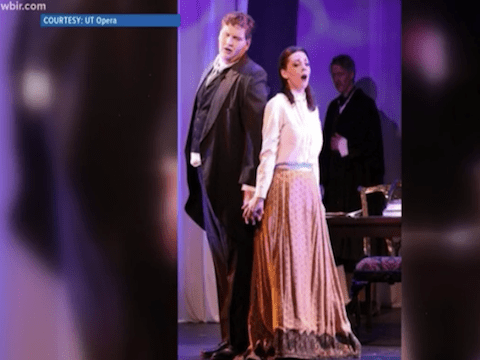Claudia Stevens told WBIR-TV that she is “too old to worry about how it’s going to turn out.”
Stevens is the librettist for Allen Shearer’s “Middlemarch in Spring,” which the UT Opera Theatre is presenting at the Bijou Theatre this weekend.
Hers is a good philosophy to have, whether one is sitting down to wade through George Eliot’s 1872 monumental doorstop of a novel, widely considered the greatest novel in the English language, or sitting in the Bijou to experience the opera itself, as I did at Friday night’s opening performance.
Any opera staged by UT Opera Theatre’s director James Marvel is going to be visually much more interesting than his shoe-string budgets ought to make possible. In “Middlemarch in Spring,” lighting and projections designer Maranda DeBusk was invaluable in supporting the story with images that many professional houses would envy.
Shearer’s music for “Middlemarch,” delightfully conducted by Kevin Class with his student orchestra, is a kind of storytelling in its own right and certainly underpinning for the excellent singing by everyone in the cast.
In the performance I saw, there is not a single voice that does not hold its own, nowhere more proven than in the closing sextet when Dorothea Brooke (Elena Stabile), Will Ladislaw (Lee Brandt), Celia Brooke (Leslie Ostransky), Sir James Chattam (James Berkeley Wilson), Mr. Brooke (Breyon Ewing) and the resurrected from the dead Edward Casuabon (Griffen Hogan Tracy) sing “But in spring we come alive. We sing and we shout and we will not be denied.”
The story begins in the home of Mr. Brooke, where he is responsible for caring for his two nieces, sisters Dorothea and Celia. Their parents have died and the girls are setting about dividing up their parents’ assets, particularly their mother’s jewelry.
The younger Celia, in a fine performance by Ostransky, is captivated by it. Dorothea, in a consuming performance by Stabile, seems to not care. Her interests are more philosophical. She wants to change the world, an outlook that may have been influenced in the original novel by the very real Commons Preservation Society, the movement that eventually became England’s Campaign to Protect Rural England, widely known as the CPRE, credited with preventing the English countryside from being visually polluted by billboards that have ruined American roadside vistas.
Her outlook is significantly shaped by her tutor, Greek and Latin scholar Edward Casaubon, sung by Tracy.
Although Dorothea Brooke is the center of the opera and Stabile has the heaviest singing load, Edward Casaubon is the most difficult character to carry off. Casaubon is intellectually hollow and physically inept, a point Marvel helps make by the way Casaubon can’t quite get how an artist wants him to pose as the model for a portrait. Getting dead twigs to dance would be easier. However, Dorothea can’t see it and marries him.
But essentially as dead wood, Casaubon turns out to be controlling. Incapable of love himself, he takes steps through his will to prevent Dorothea’s future happiness through a marriage to Will Landislaw.
As Ladislaw, Brandt has a voice that sparkles and glistens, even if his acting hasn’t developed as well.
Overall, there is a certain depressing quality about this story. Dorothea is stuck with a dead-wood husband, but is miraculously rescued when he dies. An event that ought to be sad, actually comes as a relief that not only frees Dorothea, but the whole story itself.
There is a matinee performance of “Middlemarch in Spring” today (4/15) at 2:30 p.m. with tickets available at the door. Prices are $20 for adults, $15 for seniors 60-plus, and $5 for students with a valid ID and youth under 18.
It’s a show that’s more than worth it.

